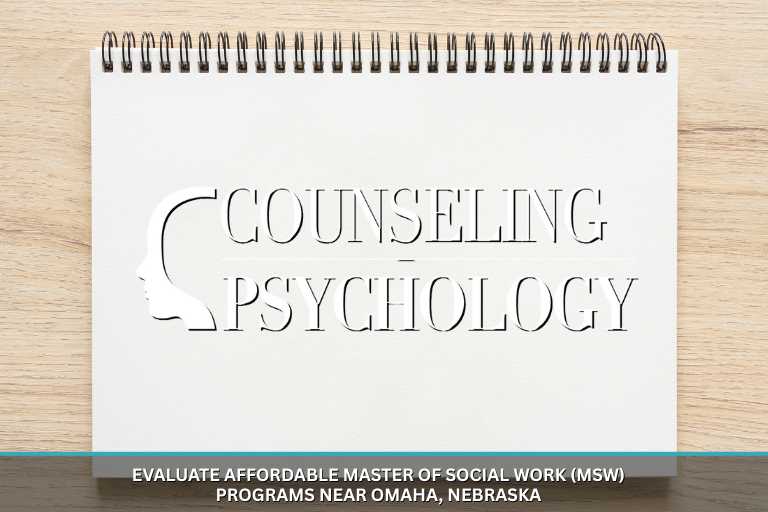Evaluate Affordable Master of Social Work (MSW) Programs Near Omaha, Nebraska

Omaha, Nebraska, sits at the intersection of community-driven values and growing mental health needs. As demand increases for qualified professionals who can serve vulnerable populations across urban and rural settings, the role of social workers continues to expand. According to the U.S. Bureau of Labor Statistics, employment of social workers is projected to grow by 7% from 2022 to 2032, faster than the average for all occupations.
For those living in or near Omaha, an affordable Master of Social Work (MSW) program can open doors to diverse career paths, from clinical mental health to school support systems, without compromising financial stability. The accessibility of low cost MSW programs in the region empowers learners to upskill without the burden of excessive student debt, enabling long-term success in a field grounded in service, empathy, and social justice.
2026 Affordable MSW Programs Near Omaha, Nebraska
University of Nebraska at Omaha
Omaha, NE - Public 4-Year - unomaha.edu
Master's - Master of Social Work
Online & Campus Based - Visit Website
The University of Nebraska at Omaha's MSW program offers an affordable and flexible educational pathway for aspiring social work professionals. With CSWE accreditation and hybrid learning options, students can complete the program in 39-63 credit hours. The program's affordability stems from its public university status and varied attendance formats. Featuring advanced generalist and clinical tracks, students gain comprehensive skills in mental health therapy, community practice, and social policy. The program accommodates both direct entry and advanced standing students, making it accessible for diverse academic backgrounds. No specific entrance exam is universally required, though professional recommendations and a competitive GPA are considered during admission.
- CSWE Accredited Program
- 63 or 39 credit hour options
- Flexible online/remote learning
- Advanced generalist curriculum
- Clinical and community focus
- Mental health therapy skills
- Nationally recognized licensure
- Dual degree opportunities
Master's - Master of Social Work and Master of Public Health
Online & Campus Based - Visit Website
UNO's innovative dual MSW and Master of Public Health program provides an economically strategic educational option for social work professionals. The program's affordability is enhanced by its public university structure and flexible credit hour range of 54-81. Students benefit from a comprehensive curriculum emphasizing social justice, cultural humility, and interdisciplinary leadership. With foundation and advanced standing tracks, the program accommodates varying student backgrounds. The dual degree option creates enhanced career marketability without significantly increasing overall educational costs. While no universal entrance exam is mandated, applicants must submit three recommendation letters and demonstrate professional experience potential.
- CSWE accredited program
- Foundation and Advanced Standing tracks
- 54-81 total credit hours
- Fall priority deadline February 1
- Three recommendation letters required
- Professional experience recommended
- Dual MSW/MPH degree option
- Field practicum experiences
- Multiple practice settings preparation
Master's - Master of Social Work and Master of Public Administration
Online & Campus Based - Visit Website
The University of Nebraska at Omaha's MSW and Master of Public Administration dual degree offers a cost-effective pathway for students seeking comprehensive social service leadership training. With total credit hours ranging from 57-81, the program provides exceptional value through its interdisciplinary approach. Affordability is further enhanced by the public university's competitive tuition rates and flexible learning formats. Students develop advanced micro, mezzo, and macro practice skills alongside public administration expertise. The program's CSWE accreditation ensures high-quality education. Admission typically requires a minimum 3.0 GPA, professional recommendations, and demonstrates commitment to driving meaningful social change without imposing strict standardized testing requirements.
- CSWE Accredited MSW Program
- Two Program Tracks: Foundation/Advanced
- 81/57 Total Credit Hours
- Fall Priority Deadline: February 1
- Minimum 3.0 GPA Required
- Professional Experience Recommended
- Three Recommendation Letters
- Dual Degree Combines Social Work/Public Administration
- Field Practicum Included
- English Proficiency Requirements
Master's - Master of Social Work and Master of Criminology and Criminal Justice
Online & Campus Based - Visit Website
UNO's unique MSW and Criminology and Criminal Justice dual degree program offers an affordable, interdisciplinary approach to social work education. With credit hour options of 57-81, students gain comprehensive training at a competitive cost. The program's public university status helps maintain reasonable tuition rates. Students explore advanced social services through criminal justice and social work lenses, preparing for complex professional challenges. The curriculum emphasizes social justice principles and provides robust field practicum experiences. Admission prioritizes professional potential over standardized testing, requiring recommendation letters and demonstrating commitment to transformative community interventions. This strategic program design makes advanced social work education more accessible and financially manageable.
- Two program tracks: Foundation & Advanced Standing
- 81 or 57 total credit hours
- Dual MSW and CRCJ degrees
- Fall priority deadline: February 1
- Spring application deadline: November 1
- Professional experience recommended
- Three recommendation letters required
- Comprehensive field practicum experience
- Focus on social justice principles
- Advanced research opportunities
Why Choose Omaha for an MSW Journey?
Choosing Omaha as a base for pursuing an MSW offers a blend of practical advantages and personal enrichment. With its mix of Midwestern charm and urban innovation, Omaha is home to various community agencies, healthcare networks, and advocacy organizations, all of which offer robust field education opportunities. The city's relatively low cost of living compared to other urban hubs also makes it an ideal location for those seeking affordable graduate education.
For aspiring social workers, Omaha’s strong professional network and state-supported resources provide fertile ground for learning and career growth. Nebraska is part of the Midwestern Higher Education Compact, which sometimes opens the door to tuition reciprocity and reduced tuition rates for out-of-state learners from partner states. This can translate to significant cost savings without compromising the quality of education.
Core Components of MSW Programs
A Master of Social Work degree prepares students to serve individuals, families, and communities through a combination of academic coursework and hands on training. Most MSW programs in Nebraska include:
- Generalist Foundation Curriculum: Emphasizes ethics, human behavior, social policy, and research methods.
- Specialization Options: Often available in areas such as clinical practice, community organizing, or school social work.
- Field Education: Supervised practicum placements within local organizations, such as behavioral health centers or child welfare agencies.
- Licensure Preparation: Programs typically align their curriculum with the requirements for Nebraska's LMSW and LICSW licensure pathways.
These components are designed to offer both theoretical grounding and practical skill development, essential for navigating the evolving demands of social work practice.
Flexible Learning Formats in the Region
Balancing academic goals with employment and family responsibilities is essential for many prospective MSW candidates. Omaha programs increasingly offer multiple learning modalities to accommodate these needs.
- Full-Time and Part-Time Options: Students can choose a track that aligns with their schedule and pacing preferences.
- Online and Hybrid Learning: Many programs now offer remote instruction combined with local field placements, giving learners across Nebraska, including rural areas, greater access to quality education.
- Advanced Standing: Available to those with a Bachelor of Social Work (BSW) from a CSWE-accredited institution. These tracks reduce credit requirements and time to degree, resulting in lower tuition and earlier entry into the workforce.
These flexible formats are especially helpful for career changers or working professionals aiming to transition into social work without pausing their income.
Cost Considerations and Tuition Strategies
Affordability is a central factor when evaluating MSW programs. Tuition rates vary depending on public vs. private institutions, residency status, and program delivery format. For reference, a typical credit hour at a public Nebraska university ranges from $350 to $600 for in-state residents.
| Factor | Potential Cost Savings Strategy |
| In-State Tuition | Residency can reduce tuition significantly |
| Scholarships & Grants | Offered by institutions and nonprofits |
| Graduate Assistantships | Combine part-time work with tuition waivers |
| Loan Forgiveness Programs | PSLF and state-specific aid for service areas |
Additionally, students are encouraged to explore federal work-study positions, employer tuition reimbursement (if applicable), and third-party scholarships offered through state or national social work organizations.
Fieldwork Opportunities Throughout Omaha
One of the most valuable aspects of an MSW program is field education. Field placements allow students to gain real world experience while applying classroom knowledge. Omaha offers a wide array of site options that reflect the region’s diverse service needs.
- Community Mental Health Centers: Exposure to crisis intervention, substance use treatment, and ongoing therapy services.
- Hospitals and Healthcare Systems: Work in behavioral health units, discharge planning, or patient advocacy.
- Public Schools: Support K–12 student development through counseling, family engagement, and behavior intervention planning.
- Nonprofits and Advocacy Groups: Contribute to programs addressing housing insecurity, intimate partner violence, refugee resettlement, and food access.
These placements not only build practical competencies but also foster professional connections that can lead to full-time employment post-graduation.
Navigating Nebraska Social Work Licensure
To practice as a licensed social worker in Nebraska, MSW graduates must fulfill specific criteria set by the state's licensing board. Understanding these requirements early helps ensure a seamless path from graduation to social work licensure.
- LMSW (Licensed Master Social Worker): Requires graduation from a CSWE-accredited MSW program and successful completion of the ASWB Master's Exam.
- LICSW (Licensed Independent Clinical Social Worker): Involves completion of 3,000 hours of post-master’s clinical supervision and a passing score on the ASWB Clinical Exam.
Additional steps include background checks and application processing. Prospective students should seek programs with curricula that align with licensure requirements to avoid delays post-graduation.
2026 Cost-Effective Omaha, NE MSW Program Options
| School Name | Highlights | Annual Estimated Tuition & Fees |
|---|---|---|
| University of Nebraska at Omaha |
|
|
Local Demand and Career Outlook
Nebraska’s mental health and human services infrastructure is expanding to meet community needs, particularly in underserved rural areas. This growth is driving a steady demand for MSW-trained professionals in a variety of roles.
- Clinical Social Work: Offer therapeutic services in outpatient clinics, inpatient settings, or private practice.
- Medical Social Work: Address psychosocial needs in hospitals, home health agencies, and long-term care facilities.
- Child and Family Services: Work with foster care systems, family preservation programs, and juvenile justice.
- School Social Work: Collaborate with educators, counselors, and families to support student success.
- Policy and Advocacy: Contribute to systemic change through government or nonprofit channels.
The state’s emphasis on behavioral health integration, especially in primary care and rural outreach, enhances opportunities for well-prepared graduates.
Making an Informed Decision
When evaluating affordable MSW programs near Omaha, several factors can help guide a strategic decision:
- Accreditation Status: Ensure the program is CSWE-accredited.
- Program Format: Consider online, hybrid, or in-person structures.
- Curriculum Strength: Review elective offerings and specialization options.
- Field Education: Examine the availability and diversity of placement sites.
- Student Support: Look for mentoring, licensure exam prep, and career advising.
Taking time to compare program features, beyond just tuition, helps build a solid foundation for a successful academic and professional journey.
Final Thoughts on Building a Social Work Career in Omaha
Pursuing a social work degree in Omaha, Nebraska, offers an affordable, flexible, and community engaged pathway into a rewarding profession. With its wide-ranging field placement options, supportive learning environments, and increasing need for behavioral health services, the Omaha region is well-suited for training the next generation of social workers. For those committed to making a difference, an MSW from a local program can serve as a catalyst for personal growth and community impact.
Sources
- Bureau of Labor Statistics: Social Workers
- Council on Social Work Education (CSWE)
- Public Service Loan Forgiveness (PSLF)
- Midwestern Higher Education Compact



